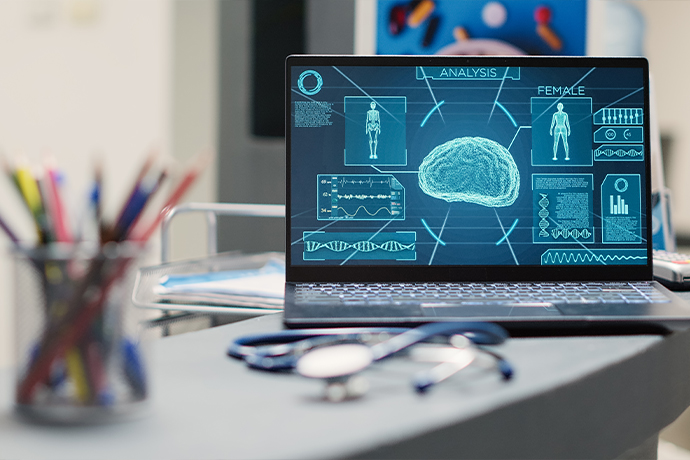 SPEAKERS
SPEAKERS
 TOPICS
TOPICS
Recent years witnessed AI integration in healthcare, revolutionizing patient care and outcomes, enhancing efficacy, precision, and accessibility

In recent years, there has been an integration of artificial intelligence (AI) in healthcare with new solutions being brought up to solve old problems. This has exposed a new approach to giving better patient care and improving processes and outcomes. Whether it is the evaluation of patients in the first place or the delivery of treatment thereafter, AI is underpinning the future of medical services as we know it, enhancing efficacy, precision, and accessibility in the process.
AI in healthcare automates various functions, from patient care to medical device management. A significant part of AI usage is in medical imaging, where the algorithms are doing a great job by analyzing imaging techniques such as X-rays, MRIs, and CT scans to help radiologists recognize abnormalities with a lot of precision. Consequently, the time needed for the diagnosis is decreased as well as the chance of human error is reduced.
Additionally, AI-driven predictive analytics are used to predict patient outcomes, to identify persons at risk of developing specified conditions, and to individualize treatment plans based on each patient’s individual genetic make-up and medical history. Such a preventive approach to health care not only improves the patients’ satisfaction, but also helps the healthcare providers to distribute resources in an efficient manner.

Innovative AI in healthcare brings a huge number of solutions that help to change the whole healthcare industry. Here are some compelling examples showcasing the transformative impact of AI:
AI technology is paving the way for a new era in medical image reading, for instance, X-rays, MRI, and CT scan images. Companies employ deep learning tools that can analyze medical images and identify fractures, tumors, and defects better and faster than radiologists could alone. The primary advantage is that it reduces the time for diagnosis and improves patient outcomes by catching diseases early and starting treatment right away.
AI makes it possible to utilize precision medicine, which takes into account enormous amounts of patient data, for instance, genetic profiles, medical backgrounds, and general lifestyles. Medical institutions use AI to differentiate the genetic markers and patterns connected to the diseases. As a result, physicians can create individual treatment plans intended precisely for patients. It helps refine therapies in such a way that both the effectiveness and safety are improved, thus promoting better patient experiences.
AI simplifies the drug discovery process through clustering molecular substances, determining the drug interactions, and predicting the target candidacy for therapy using machine learning algorithms. Pharmaceutical companies that are utilizing AI can simulate and test millions of drug compounds at a time on their computers. This is a great way to save on time and funds that are consumed in the traditional drug development process. By breaking the framework, it significantly reduces the amount of time it takes to bring about new treatments and also enhances effectiveness and safety at the same time.
AI-aided virtual health assistants and telemedicine platforms improve patients’ engagement and access to healthcare services. Corporations create AIs in the form of chatbots and virtual assistants to provide individual health guidance, symptom evaluation, and medical reminders to users on mobile apps or online channels. Telemedicine platforms also leverage AI to deliver remote consultations and monitoring services therefore, citizens can receive health care services while at home.
With AI-driven predictive analytics, healthcare providers can be able to spot individuals who are most likely to develop some conditions and take actions for prevention before the actual onset of the diseases. For example, they use data analysis software tools to spot patterns in electronic health records as well as real-time patient data to help predict health outcomes, prevent hospital readmissions, and slow disease progression. This allows healthcare organizations to perform interventions that are aimed at specific targets, allocate resources to the right places and ensure that population health outcomes are achieved.
AI-powered robotic surgery systems boost the precision and outcomes of complex procedures alongside surgeons. Surgical robot providers develop robotic surgery systems which use AI algorithms to enhance the visualization, dexterity, and control during the surgery. They shorten the turnaround time, decrease the postoperative stresses and lead to better patient satisfaction.
These situations point out a wide spectrum of uses of AI in healthcare, from diagnosis and therapy to drug discovery and patient adherence. The role of AI will continue growing as technology advances in its ability to transform the healthcare sector and create better outcomes for patients.
The use of Artificial Intelligence in healthcare, being a revolution by itself, extends the boundaries of patient care, aligns the processes as well as resources efficiently. Here are some key advantages of AI in healthcare:

Integrating AI into healthcare marks a fundamental breakthrough, improving diagnostic accuracy, facilitating operations, and advancing individualized care. Through its proven ability to maximize resources, minimize costs and yield better outcomes, AI is simply reshaping the healthcare industry. Adopting AI in the healthcare sector will be crucial as technology develops to create future healthcare systems that are more patient-focused, accessible, and efficient.